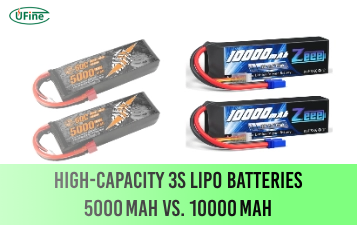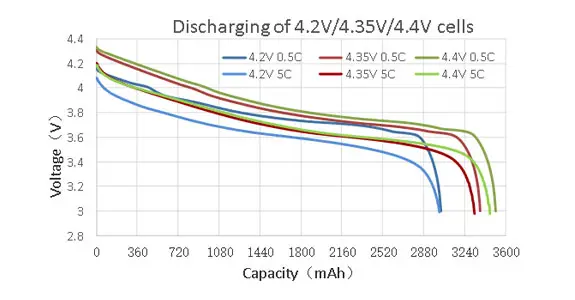What is a LiHv Battery? This article explores the definition, characteristics, applications, and critical differences between LiHv and LiPo batteries. It sheds light on their significance in various industries and addresses common queries.
Part 1. Definition of LiHv batteries
A LiHv battery, short for Lithium High Voltage battery, is rechargeable with lithium-ion technology. These batteries are known for their high energy density and high voltage output compared to traditional lithium polymer (LiPo) batteries.
LiHv batteries typically operate at a voltage range 4.35V per cell, offering greater power and longer runtime for various electronic devices and applications. People commonly use them in remote-controlled vehicles, drones, and other high-performance gadgets where power efficiency and lightweight design are essential. Their ability to provide sustained and stable power output distinguishes LiHv batteries, making enthusiasts and professionals prefer them.
Part 2. LiHv battery characteristics
High Energy Density
LiHv batteries are renowned for storing much energy in a compact size. This feature allows them to power devices for extended periods without adding excessive bulk or weight.
High Voltage Output
Compared to traditional lithium polymer (LiPo) batteries, LiHv batteries operate at a higher voltage range, typically around 4.35 volts per cell. This elevated voltage output translates to increased power delivery and longer runtime for electronic devices.
Stable Power Output
LiHv batteries provide consistent and stable power output throughout their discharge cycle. This characteristic ensures that devices powered by LiHv batteries maintain optimal performance levels, even under heavy usage or demanding conditions.
Fast Charging
Manufacturers design LiHv batteries for quick and efficient recharging. Users can rapidly replenish them, allowing less time spent waiting for batteries to charge and more time using their devices.
High Discharge Rates
LiHv batteries can handle high discharge rates, making them suitable for applications requiring power bursts. This feature benefits high-performance devices such as racing drones or remote-controlled vehicles.
Versatility
LiHv batteries are versatile power sources for various applications, including drones, remote-controlled vehicles, portable electronic devices, and more. Their adaptability makes them popular among hobbyists, professionals, and enthusiasts alike.
Part 3. LiHv battery applications
Remote-controlled Vehicles
LiHv batteries power remote-controlled cars, trucks, boats, and airplanes effectively. Their high energy density and voltage output provide extended playtime’s necessary power and runtime.
Drones and UAVs (Unmanned Aerial Vehicles)
LiHv batteries are essential in drones and UAVs, where lightweight, high-performance power sources are crucial. They enable longer flight times and support advanced features such as high-speed maneuvers and aerial photography.
Portable Electronic Devices
Various portable electronic devices such as handheld gaming consoles, smartphones, tablets, and digital cameras utilize LiHv batteries. Their compact size and high energy density make them ideal for powering these devices on the go.
Electric Skateboards and Scooters
Due to their high energy density and fast charging capabilities, people increasingly use LiHv batteries to power electric skateboards and scooters. They provide sufficient power for extended rides and quick recharge times.
Robotics
LiHv batteries play a vital role in powering robotic systems and automation equipment. Their stable power output and high discharge rates support the efficient operation of robotic arms, drones, and other robotic applications.
Portable Power Banks
Portable power banks commonly feature LiHv batteries for charging smartphones, tablets, and other USB-powered devices. Their fast-charging capabilities and high energy density ensure reliable backup power on the go.
Medical Devices
Various medical devices, such as portable defibrillators, infusion pumps, and handheld diagnostic tools, use LiHv batteries. Their reliability, long runtime, and fast-charging capabilities make them well-suited for critical healthcare applications.
Emergency Backup Power
LiHv batteries are emergency backup power sources for critical infrastructure, telecommunications equipment, and emergency lighting systems. Their fast charging and high energy density ensure reliable power during outages or emergencies.
Part 4. LiHv vs LiPo: What is the difference?
Voltage Range
LiHv batteries operate at a higher voltage range of around 4.35 volts per cell. In comparison, LiPo batteries typically operate at 4.2 volts per cell.
Energy Density
LiHv batteries generally have a higher energy density than LiPo batteries, meaning they can store more energy per unit of volume or weight.
Voltage Sag
LiHv batteries experience less voltage sag under load than LiPo batteries, resulting in more consistent power delivery throughout the discharge cycle.
Charging Voltage
LiHv batteries require a higher charging voltage compared to LiPo batteries. While people typically charge LiPo batteries to 4.2 volts per cell, they must set LiHv batteries to around 4.35 volts per cell.
Compatibility
Due to the higher voltage output, LiHv batteries may not be compatible with all devices designed for use with LiPo batteries. It’s essential to check the device’s compatibility before using LiHv batteries.
Performance
LiHv batteries generally offer better power delivery and runtime performance than LiPo batteries, especially in applications that require high voltage and sustained power output.
Safety
Both LiHv and LiPo batteries require proper handling and charging to ensure safety. However, LiHv batteries may pose a slightly higher risk of overcharging or damage if not charged correctly due to their higher voltage.
Application
LiHv batteries, such as drones, remote-controlled vehicles, and portable electronic devices, are commonly used in high-performance applications where power efficiency and longer runtime are critical. On the other hand, People more widely use LiPo batteries across various applications due to their lower cost and compatibility with a broader range of devices.
Part 5. FAQs
-
What is the range of LiHv batteries?
The range of LiHv batteries typically varies based on their specific design and intended application. However, they commonly range from around 3.8 volts to 4.35 volts per cell. -
What is the cutoff voltage for LiHv?
The cutoff voltage for LiHv batteries is usually around 3.4 to 3.5 volts per cell, depending on the manufacturer’s specifications and the desired balance between performance and longevity. -
What is too high a voltage for a LiPo battery?
A voltage exceeding 4.2 volts per cell is considered too high for LiPo batteries. It can lead to overcharging, which may result in reduced battery lifespan, increased risk of fire, or even explosion. -
What is the lowest voltage for a lithium battery?
The lowest voltage for a lithium battery depends on its chemistry and design. However, most lithium batteries have a minimum discharge voltage of around 2.5 to 3.0 volts per cell to prevent over-discharge and potential damage. -
What is the minimum and maximum voltage for a lithium battery?
A lithium battery’s minimum and maximum voltage can vary depending on the specific type and configuration. Generally, lithium batteries have a voltage range of about 2.5 to 4.35 volts per cell, with variations based on chemistry and usage requirements.
Related Tags:
More Articles

High‑Capacity 3S LiPo Batteries: 5000 mAh vs. 10000 mAh
Compare 3S LiPo 5000mAh vs 10000mAh batteries by weight, power, and use. Find the best fit for your drone, RC car, or boat setup.
Top 5 Applications for Small 3S LiPo Batteries
Small 3S LiPo batteries power drones, RC gear, wearables, and robotics with high energy and low weight. Making them ideal for compact electronics projects.
Building and Charging Your Own 3S LiPo Pack: A Step‑by‑Step Guide
Learn how to build, balance, and charge a 3S LiPo battery pack safely at home with this complete DIY guide for hobbyists and beginners.
How to Choose the Right LiPo Battery Plug Type?
Discover the best LiPo battery plug types, how to choose them, and expert tips for safe usage, soldering, and maintenance.
Choosing the Right Connector for Your 3S LiPo Battery
Choosing the right 3S LiPo connector depends on current, space, and use. Learn the pros and cons of XT60, JST, EC3, and more.




